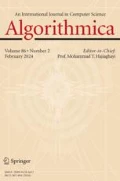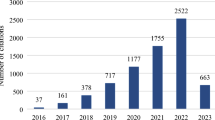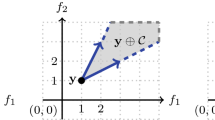Abstract
Black-box complexity studies lower bounds for the efficiency of general-purpose black-box optimization algorithms such as evolutionary algorithms and other search heuristics. Different models exist, each one being designed to analyze a different aspect of typical heuristics such as the memory size or the variation operators in use. While most of the previous works focus on one particular such aspect, we consider in this work how the combination of several algorithmic restrictions influence the black-box complexity of a problem. Our testbed are so-called OneMax functions which require to minimize the Hamming distance to an unknown target string \(z \in \{0,1\}^n\). We analyze in particular the combined memory-restricted ranking-based black-box complexity of OneMax for different memory sizes. While its isolated (1+1) memory-restricted as well as its ranking-based black-box complexity for bit strings of length n is only of order \(n/\log n\), the combined model does not allow for algorithms being faster than linear in n, as can easily be seen by standard information-theoretic considerations. Our main result is a matching upper bound. That is, we show that the (1+1) memory-restricted ranking-based black-box complexity of OneMax is linear. We also analyze its black-box complexity for memory sizes other than (1+1). Moreover, we show that these results apply to the (Monte Carlo) complexity of OneMax in the recently introduced elitist model [Doerr/Lengler GECCO 2015] that combines the above-mentioned memory-restrictions and ranking-based decisions with an enforced usage of truncation selection. Finally, we also provide improved lower bounds for the complexity of OneMax in the regarded models.
Similar content being viewed by others
Notes
The lower bound is again a simple application of Yao’s principle (Lemma 1), while the upper bound is attained, for example, by the algorithm which checks one bit at a time, going through the bitstring from one end to the other. Alternatively, the upper bound is also verified by the \((1+(\lambda ,\lambda ))\) GA of [4], thus showing that it can also be achieved by unbiased algorithms of arity two.
We do not consider in this work \((\mu +\lambda )\) elitist algorithms for \(\mu \) and \(\lambda \) both being strictly greater than one. We feel that the required tools are given in the \((1+\lambda )\) and \((\mu +1)\) settings, so that analyzing the additional settings would not give sufficiently many new insights.
The extended abstract [10] published at GECCO contains a proof that covers only the elitist case, but is more intuitive and less technical. We advise the reader who is only interested in the proof ideas to read that proof rather than the general version given here.
In more precision, one substring is the median query required for the ranking-based algorithm from [7]. See Lemma 12 in [7] for the details of this query, which is needed to verify that the fitness level k / 2 is correctly identified. It is only important for us to know that we need to make one additional non-random query, the fitness contribution of which is \(\lceil k/2 \rceil \) with very high probability. We ignore this query in this presentation, as it is obvious that it does not create any problems with our approach.
References
Anil, G., Wiegand, R.P.: Black-box search by elimination of fitness functions. In: Proceedings of Foundations of Genetic Algorithms (FOGA’09), pp. 67–78. ACM (2009)
Doerr, B.: Analyzing randomized search heuristics: tools from probability theory. In: Auger, A., Doerr, B. (eds.) Theory of Randomized Search Heuristics, pp. 1–20. World Scientific Publishing, Singapore (2011)
Doerr, B., Doerr, C.: Black-box complexity: from complexity theory to playing Mastermind. In: Proceedings of Genetic and Evolutionary Computation Conference, (GECCO’14), Companion Material, pp. 623–646. Tutorial Slides, ACM (2014)
Doerr, B., Doerr, C., Ebel, F.: From black-box complexity to designing new genetic algorithms. Theor. Comput. Sci. 567, 87–104 (2015)
Doerr, B., Johannsen, D., Kötzing, T., Lehre, P.K., Wagner, M., Winzen, C.: Faster black-box algorithms through higher arity operators. In: Proceedings of Foundations of Genetic Algorithms (FOGA’11), pp. 163–172. ACM (2011)
Doerr, B., Winzen, C.: Playing Mastermind with constant-size memory. Theory Comput. Syst. 55, 658–684 (2014)
Doerr, B., Winzen, C.: Ranking-based black-box complexity. Algorithmica 68, 571–609 (2014)
Doerr, B., Winzen, C.: Reducing the arity in unbiased black-box complexity. Theor. Comput. Sci. 545, 108–121 (2014)
Doerr, C., Lengler, J.: Elitist black-box models: Analyzing the impact of elitist selection on the performance of evolutionary algorithms. In: Proceedings of Genetic and Evolutionary Computation Conference (GECCO’15), pp. 839–846. ACM (2015)
Doerr, C., Lengler, J.: Onemax in black-box models with several restrictions. In: Proceedings of Genetic and Evolutionary Computation Conference (GECCO’15), pp. 1431–1438. ACM (2015)
Droste, S., Jansen, T., Tinnefeld, K., Wegener, I.: A new framework for the valuation of algorithms for black-box optimization. In: Proceedings of Foundations of Genetic Algorithms (FOGA’02), pp. 253–270. Morgan Kaufmann (2003)
Droste, S., Jansen, T., Wegener, I.: Upper and lower bounds for randomized search heuristics in black-box optimization. Theory Comput. Syst. 39, 525–544 (2006)
Erdős, P., Rényi, A.: On two problems of information theory. Magyar Tudományos Akadémia Matematikai Kutató Intézet Közleményei 8, 229–243 (1963)
Gross, O.A.: Preferential arrangements. Am. Math. Mon. 69, 4–8 (1962)
Jansen, T.: On the analysis of dynamic restart strategies for evolutionary algorithms. In: Proceedings of Parallel Problem Solving from Nature (PPSN’02), Lecture Notes in Computer Science, vol. 2439, pp. 33–43. Springer (2002)
Lehre, P.K., Witt, C.: Black-box search by unbiased variation. In: Proceedings of the 12th Annual Genetic and Evolutionary Computation Conference (GECCO’10), pp. 1441–1448. ACM (2010)
Lehre, P.K., Witt, C.: Black-box search by unbiased variation. Algorithmica 64, 623–642 (2012)
Motwani, R., Raghavan, P.: Randomized Algorithms. Cambridge University Press, Cambridge (1995)
Oliveto, P.S., Witt, C.: Simplified drift analysis for proving lower bounds in evolutionary computation. Algorithmica 59, 369–386 (2011). Erratum at http://arxiv.org/abs/1211.7184
Teytaud, O., Gelly, S.: General lower bounds for evolutionary algorithms. In: Proceedings of Parallel Problem Solving from Nature (PPSN’06), Lecture Notes in Computer Science, vol. 4193, pp. 21–31. Springer (2006)
Yao, A.C.C.: Probabilistic computations: toward a unified measure of complexity. In: Proceedings of Foundations of Computer Science (FOCS’77), pp. 222–227. IEEE (1977)
Acknowledgments
We would like to thank two anonymous reviewers for their very helpful suggestions on how to improve the presentation of our results. This research benefited from the support of the “FMJH Program Gaspard Monge in optimization and operation research”, and from the support to this program from EDF (Électricité de France).
Author information
Authors and Affiliations
Corresponding author
Rights and permissions
About this article
Cite this article
Doerr, C., Lengler, J. OneMax in Black-Box Models with Several Restrictions. Algorithmica 78, 610–640 (2017). https://doi.org/10.1007/s00453-016-0168-1
Received:
Accepted:
Published:
Issue Date:
DOI: https://doi.org/10.1007/s00453-016-0168-1




